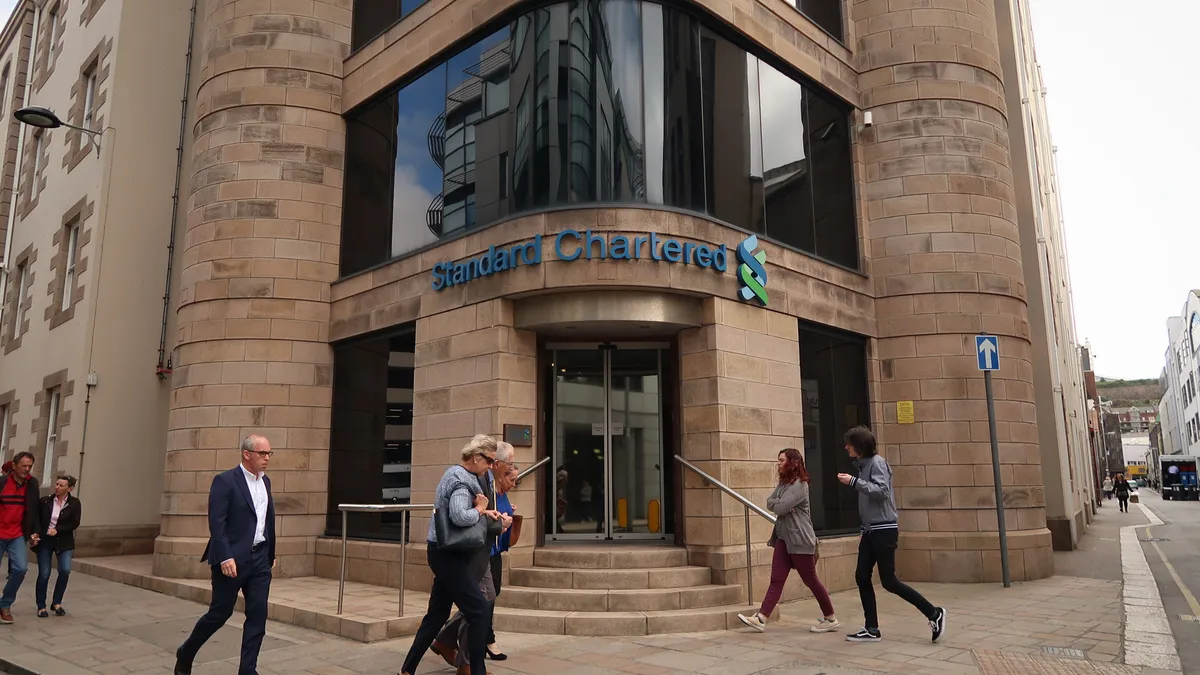Dive Brief:
- Standard Chartered created a corporate banking product that will link clients’ ESG performance to their interest rates and/or fee pricing, the British bank announced Monday.
- The bank said its ESG-linked Cash Account will connect the rates with a client’s ability to meet environmental, social and governance targets. The chosen key performance indicators “must be material and relevant to the client’s business,” according to the Aug. 12 release.
- Standard Chartered will pilot the program in Hong Kong and Singapore but expects to roll out the product to further markets “in due course,” per the release. Both pilot markets are among a growing number of jurisdictions aligning with the International Sustainability Standards Board’s climate disclosures.
Dive Insight:
Standard Chartered said the ESG targets linked to a client’s account must be “ambitious” compared to an external benchmark, the client’s peers and/or the client’s prior performance. The ESG-linked accounts join the London-based bank’s suite of sustainable products from its transaction banking team, according to the release.
The product’s launch builds on the bank’s commitment to empower clients to “meet both their treasury and sustainability goals,” Mahesh Kini, Standard Chartered’s global head of cash management for transaction banking, said in the release.
“As companies move from ambition to execution on sustainability, banks play an important role in enabling and motivating them on this journey,” Kini said.
The bank also offers a “Sustainable Account” that gives clients the ability to meet cash liquidity requirements and use surplus cash for activities that support the United Nations’ 2030 Sustainable Development Goals.
Standard Chartered’s transaction banking suite also includes financing vehicles to support the development of sustainable goods and suppliers, renewables, sustainable infrastructure and transition industries. The bank also offers green loans to other financial institutions to give them the liquidity to support sustainable development.
The news follows Standard Chartered’s announcement last week that it secured a $235 million green loan to develop a 1.35 million-square-foot solar plant in Texas. The six-year loan is expected to result in a facility operated by renewable company Trinasolar that will annually generate 5 gigawatts direct current.
In Hong Kong and Singapore, Standard Chartered has targeted two test markets where companies will be expected to comply with climate-related disclosures in line with the ISSB’s IFRS S1 and S2 frameworks beginning in fiscal 2025.
The Stock Exchange of Hong Kong announced in April that all listed companies will be required to comply with climate disclosures more closely aligned with the IFRS S2 framework for climate-related disclosures in phases depending on size for financial years that begin after January 2025. However, all listed companies will be required to begin tracking their scope 1 and 2 greenhouse gas emissions for reporting beginning January 2025.
Singapore’s corporate and finance regulator issued a statement with the city-state’s stock exchange regulator in February announcing that companies will be required to make disclosures aligned with the ISSB’s standards and disclose scope 1 and 2 emissions for reporting years beginning in 2025, with scope 3 following in 2026. Companies with more than $1 billion in annual revenue and $500 million in assets would have until fiscal 2027 to begin making disclosures.












